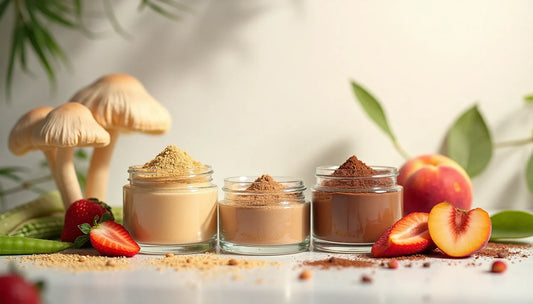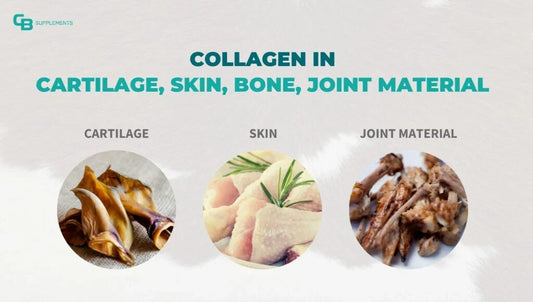The beauty and wellness world buzzes with heated discussions about vegan collagen supplements. People either praise their results or doubt whether plant-based options match up to animal-derived collagen's benefits.
Our body's collagen production naturally slows down as we get older. This leads many people to look for supplements. Traditional collagen comes from animal sources like bone broth made from pigs, beef, and fish. Plant based alternatives now give vegans new options. The biggest question stands: do these vegan alternatives work? Lab studies paint an optimistic picture. Vegan collagen boosted collagen density and elasticity by 4.7% and 5.1% compared to placebo groups. On top of that, it reduced wrinkles, texture problems, and pores by 27.5%, 20.1%, and 12.3%.
But expert opinions remain divided. Some firmly state there's "no such thing as vegan collagen supplements". They believe marketing claims mislead many buyers. The European Union hasn't approved any health claims for collagen supplements. This makes it harder for people to find evidence-backed options.
This piece dives into the latest 2025 lab results about vegan collagen's effectiveness. We'll focus on the CollaGEM-V formulation to separate marketing claims from scientific facts.
What Is Vegan Collagen and How Does It Work?

Collagen is the body's fundamental structural protein that makes up about 30% of our total protein content. It acts as the primary building block for skin, muscles, bones, tendons, and ligaments while providing vital support to connective tissues' extracellular space. The protein's remarkable rigidity and resistance to stretching make it perfect for these body structures.
How Collagen Functions in the Body
Our bodies contain at least 28 types of collagen. Types I through IV are the most common, with type I making up over 90% of the body's collagen. This vital protein creates a triple helix structure mainly composed of three amino acids: glycine, proline, and hydroxyproline. The chain forms a tight, stress-resistant configuration because glycine appears at every third position.
Specialized fibroblasts handle most of the collagen production both inside and outside cells. The process needs specific nutrients as cofactors—especially vitamin C, zinc, copper, and manganese. The body's collagen production naturally drops by about 1% each year starting in our mid-20s. This decline leads to visible aging signs like sagging skin, wrinkles, and joint problems.
Difference Between Animal and Plant-Based Collagen
Animal sources—typically bones, hides, and connective tissues of cows, pigs, or fish—provide traditional collagen supplements. Plant-based collagen supplements work quite differently.
"Vegan collagen supplements don't contain any actual collagen," explains nutritionists. These plant-based alternatives give the body essential building blocks that boost its own collagen production. You'll find vitamin C, silica, and specific amino acids in them that support the body's natural collagen synthesis.
The main difference shows in their mechanism: animal collagen provides the protein directly, while vegan alternatives supply raw materials that stimulate natural collagen production. The vegan approach tackles the root cause—declining production—instead of just replacing lost protein.
How Vegan Collagen Is Synthesized
Scientists create vegan collagen through two main methods. The first uses genetically modified microorganisms. Research has found that certain bacteria, particularly P. pastoris, can be genetically engineered to produce collagen. Scientists insert human genes that code for collagen into the microbes' genetic structure, which enables them to create human collagen's building blocks. An enzyme called pepsin helps form these components into molecules similar to human collagen.
The second method—shown by CollaGEM‑V—uses a biomimetic approach. This product offers a precise blend of free-form amino acids that match human collagen Type I, including glycine, proline, and hydroxyproline. The biomimetic tripeptide structure makes this approach unique by copying the glycine–proline–hydroxyproline sequence found abundantly in natural human collagen.
Recent studies show promising results for vegan collagen. A clinical trial revealed most important improvements in hair growth rate (45.01%, 38.54%, and 50.37% for different doses). Hair density increased by 19.64% while thickness improved by 20.51%. The skin benefits were impressive too—smoothness increased by 33.03% and crow's feet wrinkles decreased by 49.94%.
CollaGEM‑V: The Science Behind the Supplement

People looking for animal-free alternatives to traditional collagen supplements will find CollaGEM‑V a remarkable breakthrough in plant-based nutrition science. This innovative formula takes a fresh perspective on collagen supplementation. Rather than providing pre-formed collagen peptides, it gets the body to produce more natural collagen.
What Is CollaGEM‑V?
CollaGEM‑V emerges as a groundbreaking plant-based solution that meets the rising need for vegan collagen alternatives. The supplement offers a completely plant-derived option, unlike conventional collagen from animal sources such as porcine, bovine, or fish. This makes it ideal if you have vegan dietary preferences or care about environmental sustainability and animal welfare.
The science behind CollaGEM‑V lies in its biomimetic approach—it mirrors biological structures and functions found in nature. Plants cannot produce actual collagen, so this supplement provides a complex blend of amino acids that match the proportions in human type 1 collagen. The body recognizes and employs these building blocks efficiently due to this structural similarity.
Key Ingredients and Their Role
CollaGEM‑V's effectiveness comes from its precisely adjusted ingredient profile:
-
Amino Acid Complex: The formula has balanced proportions of amino acids: glycine (21-22%), L-proline (13-14%), and hydroxyproline (10-11%)—these are the most abundant amino acids in human collagen.
-
Essential Cofactors: The supplement has vitamin C (80mg), vitamin E (10mg), zinc citrate (1.5mg), manganese sulfate (0.5mg), and copper citrate (0.16mg). These nutrients act as vital catalysts for collagen synthesis.
Vitamin C plays a special role as a cofactor for prolyl hydroxylase and lysyl hydroxylase—enzymes that catalyze the hydroxylation of proline and lysine residues of procollagen. This process helps proper folding of the stable collagen triple-helix conformation. Vitamin C also neutralizes harmful reactive oxygen species that damage cells during inflammatory processes.
How It Stimulates Collagen Production
CollaGEM‑V works by activating the body's collagen-producing mechanisms. These carefully selected amino acids enter the bloodstream and signal fibroblasts—specialized cells that make collagen—to increase their activity.
Research exploring vitamin C's role in collagen synthesis reveals it specifically boosts procollagen synthesis in human skin fibroblasts. It does this without substantially changing non-collagen protein synthesis. The presence of vitamin C also lifts mRNA levels for collagen types I and III, which suggests it affects gene expression related to collagen production.
The minerals in CollaGEM‑V each serve important functions. Copper helps even out skin tone, while zinc supports immune function and collagen synthesis. Manganese protects cells from oxidative stress that can break down existing collagen.
CollaGEM‑V takes a comprehensive approach to support the body's natural collagen-producing abilities. Unlike animal-derived supplements that provide collagen fragments the body must break down during digestion, it delivers exact building blocks and cofactors needed for endogenous collagen synthesis. This strategic formula might work better for bioavailability since the body can absorb and use these isolated amino acids more readily.
2025 Lab Results: Does Vegan Collagen Work?

Laboratory studies have finally revealed whether vegan collagen supplements live up to their promises. The big question everyone wants answered: Do these plant-based alternatives actually work?
Study Design and Sample Size
A newer study, published in 2025 by researchers worked with 90 participants split into three equal groups: placebo, vegan collagen, and fish collagen. The subjects kept taking one sachet daily over 8 weeks. Researchers measured results before and after the supplement period. Tariq Karim ran another notable trial with 31 participants. The breakdown showed 14 people in the vegan collagen group, 13 in the marine collagen group, and 4 in the control group. The research team also conducted a double-blind, placebo-controlled study of CollaGEM‑V. This study looked at 66 people aged 30-50 years who took different doses (2.5g, 5g, and 10g) for 60 days.
Skin Elasticity and Wrinkle Reduction
The results turned out surprisingly positive. Vegan collagen boosted skin elasticity by 4.7% compared to placebo groups. Karim's research showed participants' skin elasticity improved by a remarkable 19% when they kept taking the supplements. The numbers looked even better for wrinkle reduction - vegan collagen decreased wrinkles by 27.5%. Skin texture problems dropped by 20.1% and pore visibility went down by 12.3%. A separate study revealed a 13% reduction in wrinkles after just 4 weeks of vegan collagen use.
Hydration and Texture Improvements
The benefits went beyond just elasticity and wrinkles. Vegan collagen users saw their skin hydration improve by 4.3% compared to the placebo group. Karim's team found similar results, with skin hydration increasing by 6%. Skin texture showed exceptional improvement too. One study reported skin smoothness jumped by 33.03% with just a 2.5g dose.
Comparison with Fish Collagen Group
Both vegan and animal-derived collagen proved beneficial, but each showed different strengths. Fish collagen users experienced better skin elasticity improvement - 52% compared to vegan collagen's 19%. Both types matched each other in hydration benefits, showing a 6% increase. Ultrasound measurements of collagen density revealed an unexpected winner. Vegan collagen outperformed its marine counterpart with a 13% increase versus 10%.
These studies showed that vegan alternatives work well despite not containing actual collagen. CollaGEM‑V's biomimetic approach provides the exact building blocks needed for collagen synthesis. The laboratory results support this scientific strategy.
Is Vegan Collagen Effective? What the Experts Say

Medical professionals have mixed opinions about vegan collagen supplements, showing how new this field really is. Doctors from different specialties share varying viewpoints on how well plant-based collagen works.
Dermatologist Opinions
Most dermatologists stay cautiously optimistic about vegan collagen. Dr. Julia Tzu, Founder of Wall Street Dermatology, points out that "it's not entirely clear that animal collagen supplements really work – though there is some preliminary data that suggest improved skin elasticity and hydration – so I'm not sure about vegan collagen supplements". She also notes that true vegan collagen supplements aren't accessible to more people, and most products are just "vegan collagen promoters".
Dr. Liakas, Medical Director of Vie Esthetics, sees things more positively. He states that certain plant-based ingredients "identically mimic human type 1 collagen and effectively boost the body's own collagen production naturally". These formulations give amino acids straight to the body and bypass digestion processes that animal collagen usually needs.
Limitations of Current Research
Scientists recognize several constraints in current vegan collagen research. We lack peer-reviewed studies that explore microbial collagen's effects on skin health. Many studies use small sample sizes, which could limit their statistical power and broader application.
Research funding by industry players raises questions about bias. One expert notes that "many of the studies looking at supplements have been funded by the companies making the supplements so the results could be biased". The FDA requires supplement makers to follow good manufacturing practices but doesn't regulate dietary supplements like prescription medications.
Placebo vs. Real Results
The difference between noticed benefits and measurable outcomes remains vital. A clinical study showed significant improvements after 60 days of treatment with vegan collagen builder. Skin smoothness increased by 33.03% while crow's feet area wrinkles decreased by 49.94%. Hair growth improved by 45.01%, 38.54%, and 50.37% with different doses.
Some experts think benefits might come from individual ingredients rather than the "vegan collagen" formula itself. Nutritionist Shona Wilkinson explains, "Anything we can do to help collagen production will be beneficial. This includes getting enough protein and nutrients into our body to help with the manufacturing of collagen". Vitamin C and other common ingredients in these products have shown benefits for skin health independently.
How to Choose a Vegan Collagen Supplement

You need to think over several things to pick the right vegan collagen supplement. The market now has plant-based options of all sizes, and knowing what works best will help you make smart choices.
Check for Active Ingredients
A vegan collagen supplement's success depends on what goes into it. Here's what you should find in good products:
-
Essential amino acids – You'll need glycine, proline, and hydroxyproline that are the foundations of collagen's structure
-
Vitamin C – Your body needs this to make collagen, usually 80-100mg works best
-
Hyaluronic acid – Low-molecular weight (approximately 200kDa) types get absorbed better
-
Silica – Bamboo shoots often provide this to help form collagen
Quality supplements also pack in helpful nutrients like zinc, copper, and biotin that work together with the main ingredients. Your body absorbs free-form amino acids better, so look for those.
Avoid Misleading Marketing Claims
You should watch out for misleading labels. Here's the truth - real "vegan collagen" doesn't exist in nature because plants don't have collagen in their DNA. Most products called vegan collagen actually help your body make more of its own collagen.
Don't trust products that make big promises without proof. Break down a company's website and see if their formulas have passed independent clinical tests instead of just trusting supplier data. Programs like "Collagen Verified" are a great way to get products with proven claims.
Recommended Dosage and Forms (Powder, Liquid, Gummies)
Experts suggest taking 2.5-15 grams of vegan collagen supplements daily. New users should start with smaller amounts and slowly take more.
Powders give you better value and purity than other options. Liquid supplements save you from mixing. Gummies might be handy but have less collagen per serving and extra sugars and fillers. Capsules offer exact doses without worrying about taste.
Conclusion
Recent lab results paint an optimistic picture about vegan collagen's effectiveness. Plant-based formulas like CollaGEM-V have showed remarkable improvements in skin health. The numbers speak for themselves - a 4.7% boost in skin elasticity and a 27.5% decrease in wrinkles from controlled studies. These results make plant-based alternatives worth a serious look.
Vegan collagen alternatives take a unique path to skin health. They don't just replace collagen like animal-based products do. These plant-based options give your body the exact ingredients it needs to make its own collagen. This smart approach tackles the real reason behind collagen loss.
In spite of that, buyers should stay skeptical. Many products with "vegan collagen" labels just boost collagen production without containing actual collagen. Reading ingredient lists becomes crucial. Good products should have amino acids like glycine, proline, and hydroxyproline, among other important ingredients such as vitamin C, zinc, and copper.
Plant-based alternatives pack quite a punch. They sometimes work better than traditional options. Look at the numbers - vegan supplements increased collagen density by 13% compared to marine collagen's 10%. Animal-derived collagen still wins in other areas, so both types work well depending on what you need and value.
The collagen supplement world keeps changing as new research comes out. Expert opinions vary and we need more long-term studies. Current evidence shows that vegan collagen supplements help boost natural collagen production effectively. People looking for plant-based options now have science-backed choices that work, but it's important to keep expectations realistic about supplement results.
FAQs
Q1. How effective are vegan collagen supplements compared to animal-derived ones? Recent studies show that vegan collagen alternatives can be quite effective. While they don't contain actual collagen, they provide the building blocks for the body to produce its own. Some vegan formulations have shown improvements in skin elasticity, wrinkle reduction, and hydration levels comparable to animal-derived supplements.
Q2. What key ingredients should I look for in a vegan collagen supplement? Look for supplements containing essential amino acids like glycine, proline, and hydroxyproline, as well as vitamin C, which is crucial for collagen synthesis. Other beneficial ingredients include hyaluronic acid, silica, zinc, and copper. These components work together to support your body's natural collagen production.
Q3. How long does it typically take to see results from vegan collagen supplements? Results can vary, but it generally takes several weeks to months of consistent use to notice significant improvements. Some studies have shown measurable changes in skin elasticity and wrinkle reduction after 8 weeks of daily supplementation. However, individual results may differ based on factors like age, diet, and overall health.
Q4. Are there any potential side effects or risks associated with vegan collagen supplements? Vegan collagen supplements are generally considered safe for most people. However, as with any supplement, it's important to follow recommended dosages and consult with a healthcare professional before starting, especially if you have any pre-existing health conditions or are taking medications.
Q5. Can vegan collagen supplements help with joint health and hair growth? Some studies suggest that vegan collagen alternatives may benefit joint health and hair growth. One clinical trial reported improvements in hair growth rate, density, and thickness after regular supplementation. However, more research is needed to fully understand the extent of these benefits across different formulations and individuals.




